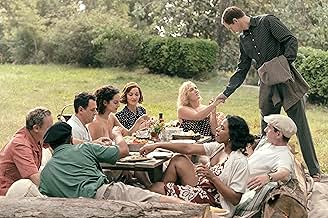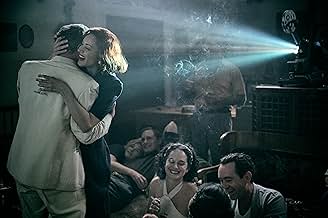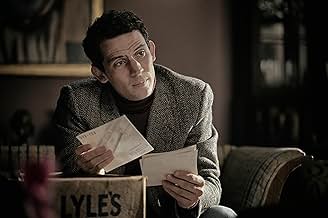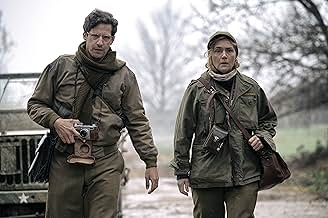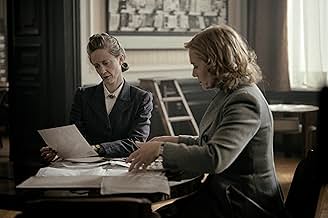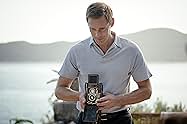L'histoire de la photographe Elizabeth 'Lee' Miller, mannequin de mode devenue correspondante de guerre acclamée pour le magazine Vogue pendant la Seconde Guerre mondiale.L'histoire de la photographe Elizabeth 'Lee' Miller, mannequin de mode devenue correspondante de guerre acclamée pour le magazine Vogue pendant la Seconde Guerre mondiale.L'histoire de la photographe Elizabeth 'Lee' Miller, mannequin de mode devenue correspondante de guerre acclamée pour le magazine Vogue pendant la Seconde Guerre mondiale.
- Réalisation
- Scénario
- Casting principal
- Nomination aux 1 BAFTA Award
- 3 victoires et 17 nominations au total
Résumé
Reviewers say 'Lee' is a biographical drama about Lee Miller, with Kate Winslet's performance as a standout. Many praise Winslet and the film's depiction of Miller's life. However, some criticize the pacing, script, and direction, finding it slow and lacking emotional depth. The film's handling of historical events receives mixed reactions. The supporting cast is noted, though some feel underutilized. Cinematography and production design are praised, but narrative structure and character development are contentious.
Avis à la une
Kate Winslet turns in quite an effective performance here as the eponymous photographer who originally arrived in London to be with husband Roland Penrose (Alexander Skarsgård) and to work for the formidable Audrey Withers (Andrea Riseborough) at "Vogue" magazine as a fashion photographer. With the rise of the Nazis seemingly unstoppable throughout continental Europe, Penrose spends more time on the war effort leaving her more and more determined to prove that she is every bit as capable as her male counterparts. Needless to say there's quite a bit of resistance to her participation in combat zones, but thanks to her own perseverance and an alliance with David Scherman (Andy Samberg) she is soon actively involved in wartime photography and by the end is visiting some of the most ghastly sites ever built seeing, at first hand, the truly stomach-churning atrocities left behind by a now defeated war machine that turned large-scale annihilation into an art form. Her story is being relayed from the comfort of her British home in the 1960s to a man whom we assume is just a journalist. Indeed his obvious nervousness and her antipathetic attitude towards him and his task seems to suggest she sees no value in her memories, but as we develop the threads of her life, we begin to sense that something more exists between her and this young man (Josh O'Connor) which quite neatly puts quite a lot of perspective on the choices made by a woman who probably did put career first. Through the characters of Solange (Marion Cotillard) and Nusch (Noémie Merlant) the film also attempts to put a little meat on the bones of the story of those who had to "co-operate" with their new overlords. Some willingly, some less-so and some, well they didn't live to tell. The production and battle scenarios aren't really so effective - maybe just bit too manicured, the script is a little dry and there's maybe just a bit too much of it, but Winslet shows here that she has plenty of capacity to take on a role that it would have been easy to shower with bravado, but instead she brings a more considered charisma to her portrayal of a woman whose bloody-minded courage provided for some of the most significant imagery of the Second World War. Imagery that even now makes your flesh crawl.
Have just got home from watching "LEE" at my local Picture House.
Blimey, that was DARK. Well, it isn't all dark, but by the time you get to the last half hour... oooft. Let's just say that "feelgood" isn't a term anyone's ever going to apply to this one.
It's not like I went in unprepared: I'd seen Kate Winslet doing the promotional chat show appearances, and as I am already a great admirer of Lee Miller's photojournalism, I knew the kind of subject matter we'd inevitably be exploring, but still... don't say you haven't been warned. This film presents you with you the hideous fact of Nazi genocide, very convincingly as the revelation it must have been in the moment, without (thankfully) a scrap of sentimentality.
Winslet is magnificent in the title role - as is everyone else, to be honest: there are no shoddy performances to be found - and, speaking as a Rolleiflex TLR user myself, it was clear that she had done her homework viz how to wield that lovely machine convincingly. There were moments when the nit-picky photography pedant in me did query whether some of the interior photos were being taken in such low light that it was unlikely to have left any usable impression on the relatively slow film stock available in the 1940s, but let's not quibble!
It's quite a long movie and events are presented in a simple, linear fashion (via a series of chronological flashbacks) with rather uniform pacing throughout - personally, I would have preferred a bit more variation in pace; your taste may differ.
My only really negative criticism has to do with one, frankly bizarre, piece of casting. The role of Englishman Roland Penrose is given to Swedish star Alexander Skarsgård - whose plucky attempt at an English accent is ...I think "variable" is the kindest word for it. It was hard to tell what part of England he was supposed to be from, or indeed what social class, and there were several moments when he didn't sound any kind of English at all. I had to suspend my disbelief on some pretty strong elastic whenever he opened his mouth. Ah well... go figure!
Blimey, that was DARK. Well, it isn't all dark, but by the time you get to the last half hour... oooft. Let's just say that "feelgood" isn't a term anyone's ever going to apply to this one.
It's not like I went in unprepared: I'd seen Kate Winslet doing the promotional chat show appearances, and as I am already a great admirer of Lee Miller's photojournalism, I knew the kind of subject matter we'd inevitably be exploring, but still... don't say you haven't been warned. This film presents you with you the hideous fact of Nazi genocide, very convincingly as the revelation it must have been in the moment, without (thankfully) a scrap of sentimentality.
Winslet is magnificent in the title role - as is everyone else, to be honest: there are no shoddy performances to be found - and, speaking as a Rolleiflex TLR user myself, it was clear that she had done her homework viz how to wield that lovely machine convincingly. There were moments when the nit-picky photography pedant in me did query whether some of the interior photos were being taken in such low light that it was unlikely to have left any usable impression on the relatively slow film stock available in the 1940s, but let's not quibble!
It's quite a long movie and events are presented in a simple, linear fashion (via a series of chronological flashbacks) with rather uniform pacing throughout - personally, I would have preferred a bit more variation in pace; your taste may differ.
My only really negative criticism has to do with one, frankly bizarre, piece of casting. The role of Englishman Roland Penrose is given to Swedish star Alexander Skarsgård - whose plucky attempt at an English accent is ...I think "variable" is the kindest word for it. It was hard to tell what part of England he was supposed to be from, or indeed what social class, and there were several moments when he didn't sound any kind of English at all. I had to suspend my disbelief on some pretty strong elastic whenever he opened his mouth. Ah well... go figure!
I've seen a few review that seem quite dismissive about the scope and importance of Lee. But if you know about the limited freedom of women during this time period you will totally appreciate the audacity and productivity delivered here. Lee was spurned on by personal trauma to do good with her hard fought freedom to operate in a man's world.
Lee has all the period clothing and historical accuracy which is no small feat, while showing the sheer determination it took to achieve access to the final Nazi front of WW2. People back home in the US didn't believe exactly the horrors and certainly not the numbers of the Holocaust. It was the undeniable courageous journey by Lee which brought back the unmistakeable proof and witness of an evil place in history
Knowing that one can't unsee certain such things in person gives one empathy for the cost of doing photo journalism. Many get martyred while doing their work when jailed or taken hostage in authoritarian regimes. But in this case, to have survived seems as permanently affecting a way to finish such an important task.
Lee has all the period clothing and historical accuracy which is no small feat, while showing the sheer determination it took to achieve access to the final Nazi front of WW2. People back home in the US didn't believe exactly the horrors and certainly not the numbers of the Holocaust. It was the undeniable courageous journey by Lee which brought back the unmistakeable proof and witness of an evil place in history
Knowing that one can't unsee certain such things in person gives one empathy for the cost of doing photo journalism. Many get martyred while doing their work when jailed or taken hostage in authoritarian regimes. But in this case, to have survived seems as permanently affecting a way to finish such an important task.
We were lucky to catch a preview of "Lee" tonight and what a film it is.
This biopic about Lee Miller is not only a powerful look at her incredible life but also a strong reminder of the horrors of war. As both a groundbreaking photographer and war correspondent, the film captures the devastating things she witnessed and the emotional toll they took on her.
The storytelling is gripping and moving, offering a deep look into resilience, art, and humanity in the face of such atrocities. I highly recommend checking it out when it comes out in Australia later this month - it's a film that will stay with you.
This biopic about Lee Miller is not only a powerful look at her incredible life but also a strong reminder of the horrors of war. As both a groundbreaking photographer and war correspondent, the film captures the devastating things she witnessed and the emotional toll they took on her.
The storytelling is gripping and moving, offering a deep look into resilience, art, and humanity in the face of such atrocities. I highly recommend checking it out when it comes out in Australia later this month - it's a film that will stay with you.
Greetings again from the darkness. Being courageous and heroic doesn't mean one must wear a cape and possess super powers. In fact, some of the most courageous folks use their words (spoken and written), their feet (for marching into battle), and as we learn here, even their eyes. Lee Miller is a famous photojournalist who used her words to get to the front lines of WWII, her feet to march with soldiers, and her eyes to decide where to focus her camera. The film is based on the biography, "The Lives of Lee Miller", by her son Antony Penrose. It's directed by renowned choreographer Ellen Kuras (her feature film directorial debut) and co-written by Liz Hannah, Marion Hume, John Collee, and Lem Dobbs.
Oscar winner Kate Winslet stars as Lee Miller, and her fierce and committed performance validates what a passion project this was for her, and just how hard she worked to bring the project to fruition. Lee Miller was a well-known fashion model, and we see her hanging out with her band of artistic friends in pre-war France. It's here where she first meets Roland Penrose (Alexander Skarsgard), and their initial intellectual bantering leads right to the bedroom. This after we hear Ms. Miller proclaim that she had ever only been good at drinking, having sex, and taking pictures. She speaks this line in 1977 while being interviewed (by Josh O'Connor, CHALLENGERS, 2024) about her life. It's this interview that provides some structure to the film, while confirming that drinking and smoking were hobbies until the end.
It's really Lee's photographs that guide us through each phase. She and Roland relocate to London during the war, and soon enough she's taking pictures under the guidance of British Vogue editor Audrey Withers (Andrea Riseborough). Continually having to stand up for herself after being rebuked for being a woman doing a man's job, Lee partners with (and ultimately befriends) Life magazine photographer David E Scherman (a surprisingly effective Andy Samberg). Their work documenting history becomes historic in itself. After hearing about the "missing", they were the first journalists to document Dachau concentration camp and the tragic prisoner trains.
Although British Vogue refused to publish the photographs as being too "disturbing", the U. S. magazine did publish, creating awareness of the atrocities. The segment that leads to the infamous photo of Lee bathing in Hitler's tubs is handled expertly. If there is a flaw in the film, it's that we never really get to know Lee's friends, so as she re-connects with Solange (Oscar winner Marion Cotillard), their meeting doesn't hit as hard as it should. Still, the cinematography from Pawel Edelman and the accomplished performance by Kate Winslet, do justice to the stunning (actual) photographs shown. There is a dramatized twist near the film's end that pays homage to Lee and her story. An early comment about Hitler is all too relevant today, and the battle scenes and photographs reinforce what courage Lee Miller exhibited.
Opens in theaters on September 27, 2024.
Oscar winner Kate Winslet stars as Lee Miller, and her fierce and committed performance validates what a passion project this was for her, and just how hard she worked to bring the project to fruition. Lee Miller was a well-known fashion model, and we see her hanging out with her band of artistic friends in pre-war France. It's here where she first meets Roland Penrose (Alexander Skarsgard), and their initial intellectual bantering leads right to the bedroom. This after we hear Ms. Miller proclaim that she had ever only been good at drinking, having sex, and taking pictures. She speaks this line in 1977 while being interviewed (by Josh O'Connor, CHALLENGERS, 2024) about her life. It's this interview that provides some structure to the film, while confirming that drinking and smoking were hobbies until the end.
It's really Lee's photographs that guide us through each phase. She and Roland relocate to London during the war, and soon enough she's taking pictures under the guidance of British Vogue editor Audrey Withers (Andrea Riseborough). Continually having to stand up for herself after being rebuked for being a woman doing a man's job, Lee partners with (and ultimately befriends) Life magazine photographer David E Scherman (a surprisingly effective Andy Samberg). Their work documenting history becomes historic in itself. After hearing about the "missing", they were the first journalists to document Dachau concentration camp and the tragic prisoner trains.
Although British Vogue refused to publish the photographs as being too "disturbing", the U. S. magazine did publish, creating awareness of the atrocities. The segment that leads to the infamous photo of Lee bathing in Hitler's tubs is handled expertly. If there is a flaw in the film, it's that we never really get to know Lee's friends, so as she re-connects with Solange (Oscar winner Marion Cotillard), their meeting doesn't hit as hard as it should. Still, the cinematography from Pawel Edelman and the accomplished performance by Kate Winslet, do justice to the stunning (actual) photographs shown. There is a dramatized twist near the film's end that pays homage to Lee and her story. An early comment about Hitler is all too relevant today, and the battle scenes and photographs reinforce what courage Lee Miller exhibited.
Opens in theaters on September 27, 2024.
Le saviez-vous
- AnecdotesLee Miller was one of just four female photographers accredited as official war correspondents with the US armed forces.
- GaffesArinze Kene who plays Major Jonesy is an African American in charge of white troops in 1944. African American soldiers did not see combat until later that year and African American officers would not have been in charge of white troops until after the desegregation of the armed forces in 1948.
- Citations
Lee Miller: [Handing a knife to a girl she has just saved from rape] Next time, cut it off.
- Crédits fousThe closing credits have some "what happened to" explanations ; and some of Lee's original photos, often alongside the ones which were recreated for the film.
- ConnexionsFeatured in The 7PM Project: Épisode datant du 21 octobre 2024 (2024)
Meilleurs choix
Connectez-vous pour évaluer et suivre la liste de favoris afin de recevoir des recommandations personnalisées
- How long is Lee?Alimenté par Alexa
Détails
- Date de sortie
- Pays d’origine
- Site officiel
- Langues
- Aussi connu sous le nom de
- Lee
- Lieux de tournage
- Sociétés de production
- Voir plus de crédits d'entreprise sur IMDbPro
Box-office
- Montant brut aux États-Unis et au Canada
- 2 005 488 $US
- Week-end de sortie aux États-Unis et au Canada
- 713 255 $US
- 29 sept. 2024
- Montant brut mondial
- 24 612 473 $US
- Durée
- 1h 57min(117 min)
- Couleur
- Mixage
- Rapport de forme
- 1.85 : 1
Contribuer à cette page
Suggérer une modification ou ajouter du contenu manquant







